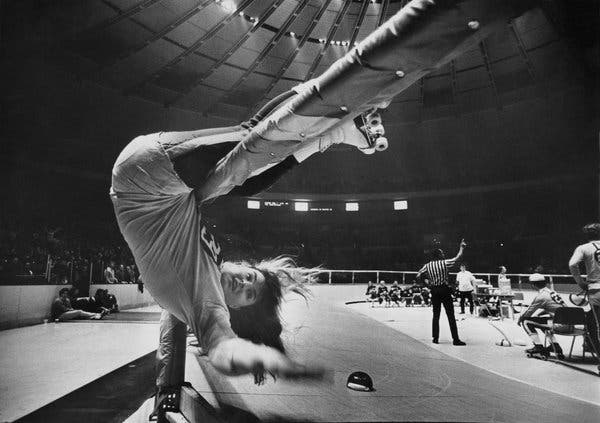You’re reading In Her Words, where women rule the headlines.
Sign up here to get it delivered to your inbox.
Let me know what you think at dearmaya@nytimes.com.
“It’s a pretty dramatic shift.”
— Alice Eagly, a social psychologist who analyzed public perceptions of women’s competence over 70 years
I began writing this newsletter a year ago as part of The Times’s mission to engage female readers. Our goals were to start conversations around women’s issues, to call attention to coverage for and about women — and to bring it all together in one place. But I still often got asked: Why is a newsletter just about women necessary?
The reasons are multifold: Women still earn far less money than men; parenthood in heterosexual couples is still uneven; intimate partner violence is a leading killer of American women; and fierce debates continue over women’s health care, to name a few.
I was reminded of our mission again this week when I read the results of a new study, published by the American Psychological Association, that found that a majority of Americans (finally) believe women are just as competent as men, if not more so.
Alice Eagly, the social psychologist at Northwestern University who led the study, noted: “It’s a pretty dramatic shift.”
“As the roles of women and men have changed since the mid-20th century,” she said, “so have beliefs.”
Eagly and her colleagues examined public opinion polls representing the views of more than 30,000 adults from 1946 to 2018, looking specifically at how they rated communion (compassion, sensitivity, warmth); agency (ambition, aggression, assertiveness); and competency (intelligence, organization, creativity) along gender lines.
In 1946, 35 percent of people thought men and women were equally intelligent. In 1995, 43 percent thought so. Last year, 86 percent believed men and women were equally intelligent. And those who favored one sex over the other thought women were smarter.
As Eagly told me, this represents “massive social change.” Part of that, she said, has to do with the fact that for many years, we simply didn’t see examples of women leading — not as journalists, not as scientists and not as politicians.
But that’s changing. Just this year, college-educated women edged out college-educated men in the work force. And tonight, the first of two Democratic presidential debates this week will air. There are, of course, a record number of women running.
[Join us for live analysis on debate night. Download the NYTimes app now to get ready.]
Which brings me back to this newsletter. Some may still wonder why we need a newsletter devoted exclusively to women. But that competence study — while encouraging — shows we still have far to go.
Soon, you will have a new writer to guide you. I’ll be moving into a new role as a culture editor (blending two of my favorite subjects: gender and pop culture), and this will be my last newsletter.
But not to worry, In Her Words isn’t going anywhere. Jessica Bennett, our gender editor, will be filling in for the next month, and we’ll have lots more in store for you very soon.
But before I sign off, a thank you.
Over the past year, the In Her Words community has grown into 200,000 loyal, engaged, sharp readers who have sent thousands of emails (I read every one). They have shared stories of how the patriarchy has shaped their understanding of the world and of reclaiming their anger, and voice — stories that have inspired me and have made me laugh and cry at my desk.
You can always write to me at dearmaya@nytimes.com. Here’s to the day when all people think women are just as competent as men.
Sign up here to get future installments of In Her Words delivered to your inbox.
______
What else is happening
Here are five articles from The Times you might have missed.

CreditBarton Silverman/The New York Times
-
“Noise, color, body contact.” At first glance, roller derby seems like a 21st-century feminist punk fever dream. But this full-contact whirlwind on wheels has roots stretching back nearly a century. [Read the story]
-
“The squad.” Four women have reached a level of notoriety virtually unheard-of for freshman House members, thanks to relentless conservative fire. [Read the story]
-
“All I want is for my children to be proud of who they are.” Women and girls are breaking a Mexican tradition that excludes them, to keep it alive in Brooklyn. [Read the story]
-
“Identity affirming purchases.” In 2019, simple proclamations of womanhood are more popular than ever. But what, exactly, do they achieve? [Read the story]
-
“My first feeling up there was that of being absolutely on top of the world.” Gertrude Benham climbed more than 300 peaks to satisfy a “spirit of wanderlust.” A new Overlooked obituary. [Read the story]
______
From the archives, 1984: Don’t be ‘patronizing’
In 1984, Vice President George Bush and Geraldine A. Ferraro, his Democratic opponent for that office, debated for 90 minutes in a national broadcast — the first ever broadcast involving a woman seeking a national office. Ferraro’s running mate was Walter F. Mondale.
At one point, Ferraro warned Bush not to be “patronizing” toward her. She also chided a panelist who questioned her about whether she — as a woman — would have credibility as commander in chief, should she ascend to the presidency.
“Are you saying I would have to have fought in a war in order to love peace?” she asked.

